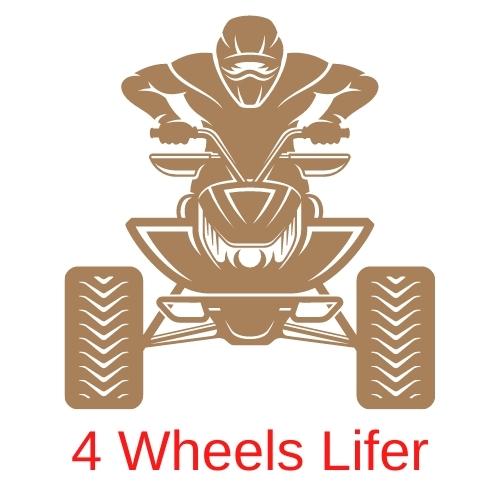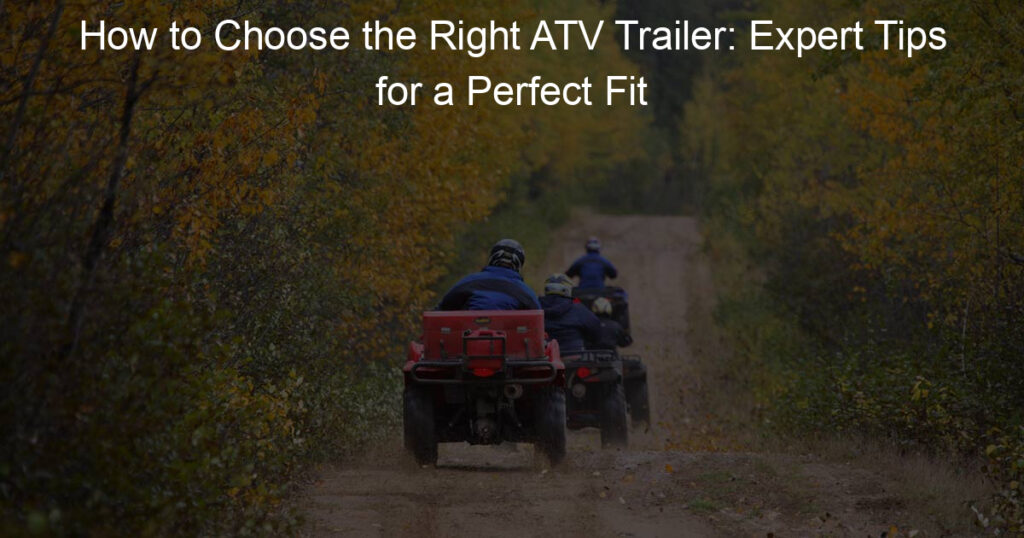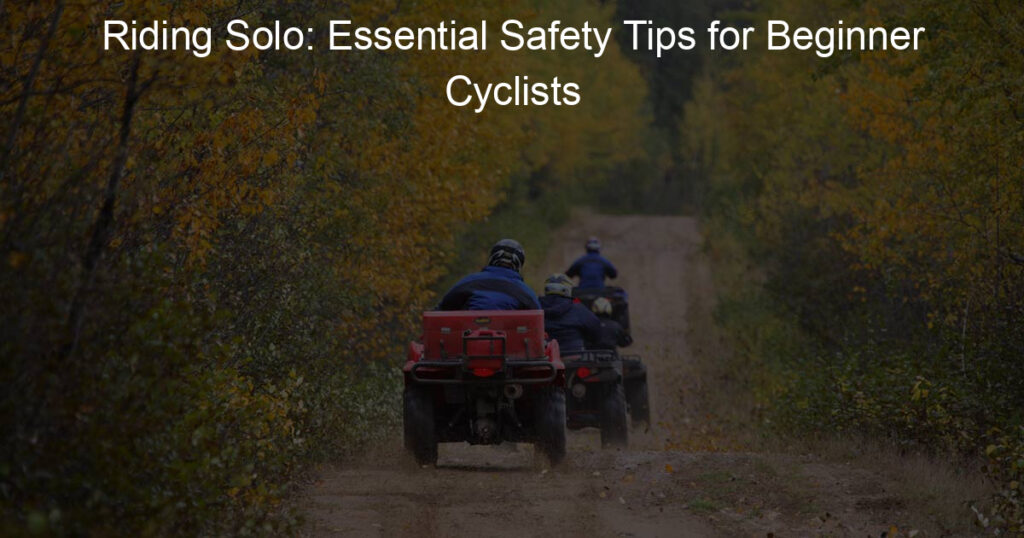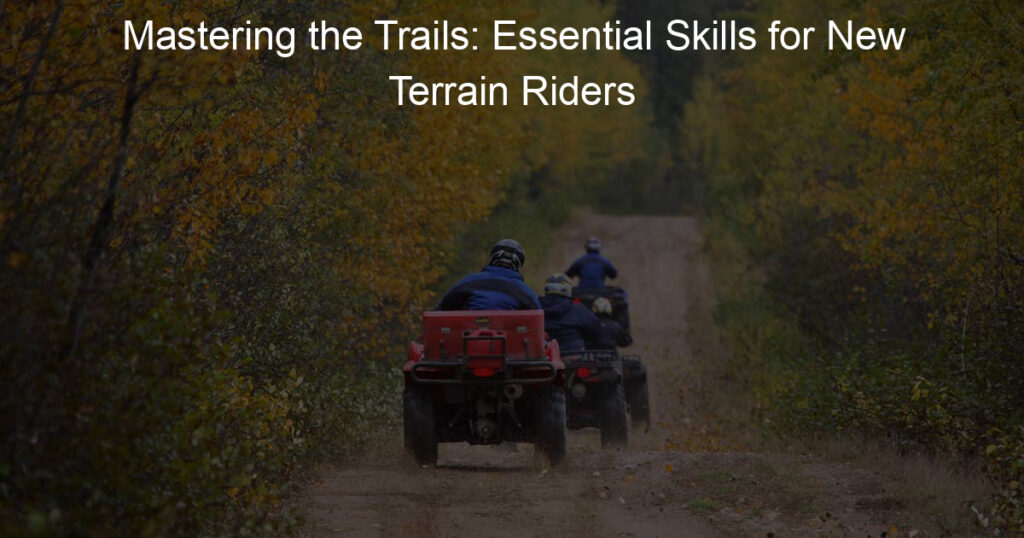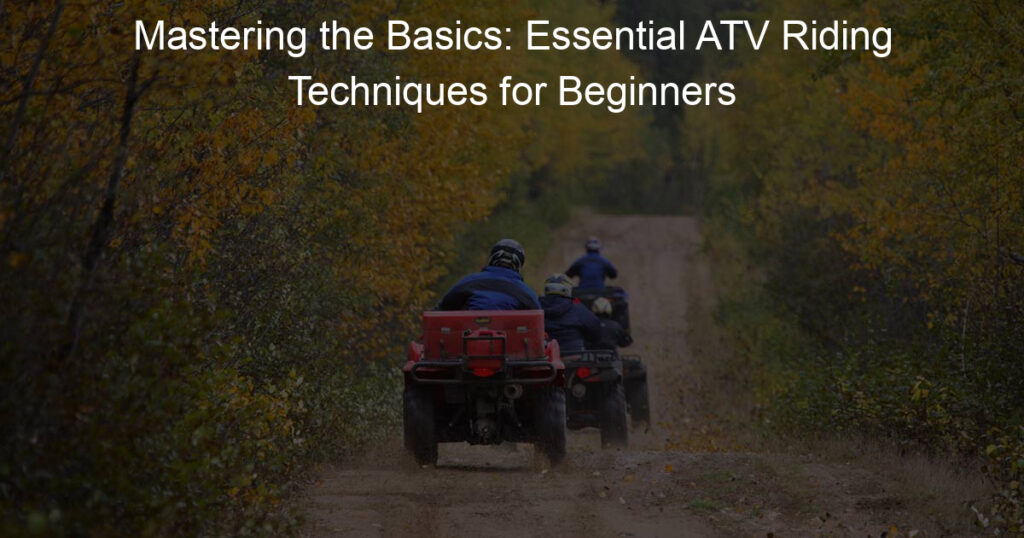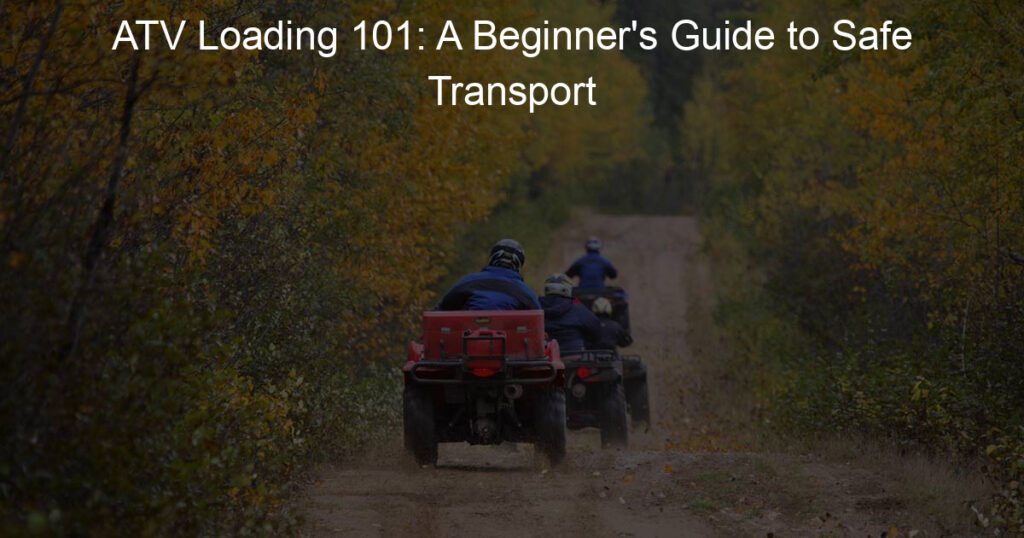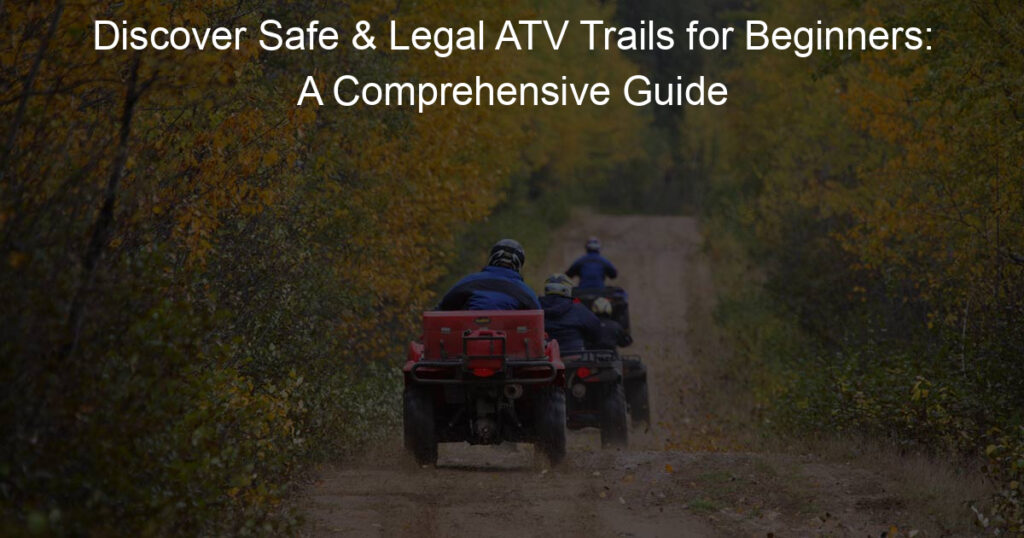Choosing the right ATV trailer can feel like a daunting task, given the numerous options available in the market.
As an ATV owner, you certainly want to acquire a trailer that not only fits your recreational vehicle but also delivers durability, functionality, and ease of use.
In this article, we’ll delve into how to choose the right ATV trailer that suits their needs and preferences.
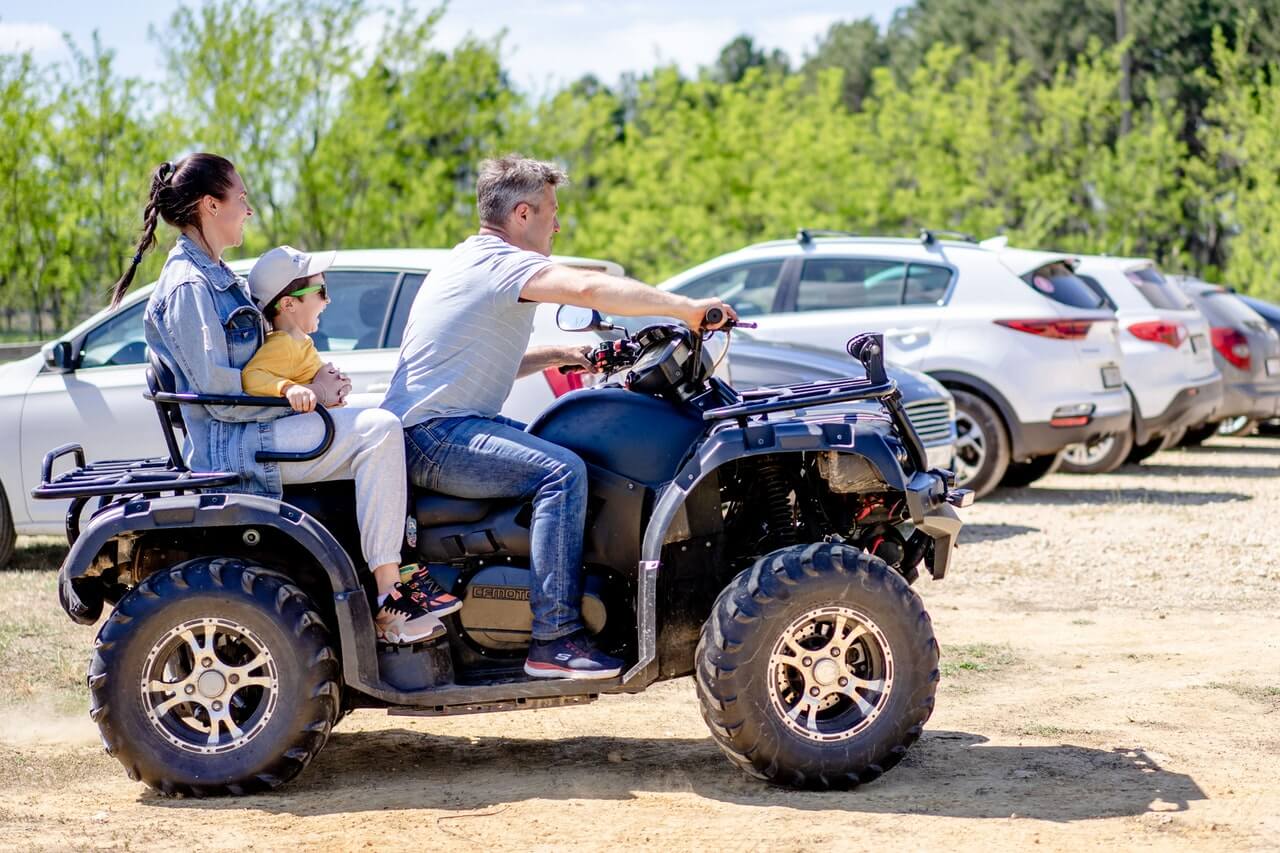
When buying an ATV trailer, it’s crucial to factor in aspects such as the materials used, the size, customizability, and compatibility with your vehicle. Moreover, it’s essential to examine pricing and quality considerations, as well as practical tips for storing and using your new trailer.
By being mindful of these important elements, you can make an informed decision and efficiently narrow down your search to find the ideal ATV trailer for you.
Key Takeaways
- Consider materials, size, and customizability when choosing an ATV trailer
- Pay attention to pricing, quality, and compatibility with your vehicle
- Keep in mind practical tips for storage and use of your new trailer
How to Choose the Right ATV Trailer
As an ATV enthusiast, I know that selecting the right ATV trailer can be an essential part of making the most of your off-roading experience.
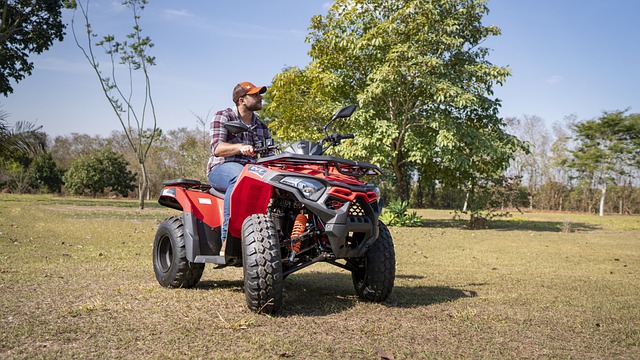
There are several types of trailers available, and understanding their features can help you choose the best one for your needs.
Open trailers are one of the most popular options for transporting ATVs. These trailers provide easy access to your ATV, making loading and unloading a breeze. Open trailers come in various sizes, so you can easily find one that fits your ATV and towing vehicle. Nonetheless, keep in mind that open trailers don’t provide protection against weather or theft.
Enclosed trailers offer greater security for your ATV by protecting it from the elements and providing a locked space to prevent theft. They are generally more expensive than open trailers but can be worth the investment if you plan to transport your ATV long distances or store it for extended periods.

Utility trailers are versatile and can be used for various purposes, including hauling ATVs. These trailers typically have a flat bed-like surface with a railing or sidewalls to help secure your ATV. Utility trailers come in both open and enclosed designs, so you can choose the best one for your needs.
Deckover trailers are characterized by their wide, flat decks that sit above the wheels. This design allows for easy loading and provides plenty of space for your ATV. Deckover trailers can be open or enclosed and are available in various lengths to accommodate multiple ATVs if needed.
Dump trailers may not be the first option that comes to mind, but they can be useful when you need to haul more than just your ATV. These trailers have a hydraulic lift system that can easily dump dirt, gravel, or debris, making them ideal for trail maintenance or farm work. Just ensure that the dump trailer has a flat surface that can securely hold your ATV during transport.
As a friendly reminder, always consider the weight capacity, hitch receiver, and towing vehicle compatibility before purchasing an ATV trailer. This will ensure a safe and enjoyable experience for both you and your ATV.

Essential Features of ATV Trailers
When I’m choosing an ATV trailer, several essential features make a significant difference in functionality, performance, and safety.
Here, I’ll discuss some of these key features that I always consider before making a purchase.
Firstly, the trailer lights are crucial for visibility and safety, especially during nighttime rides or in poor weather conditions. I make sure the trailer I choose has working taillights, brake lights, and turn signals that are easily visible to other drivers on the road.
The trailer’s brakes are another essential feature. A well-functioning brake system ensures that my trailer can come to a smooth and controlled stop, reducing the risk of accidents.
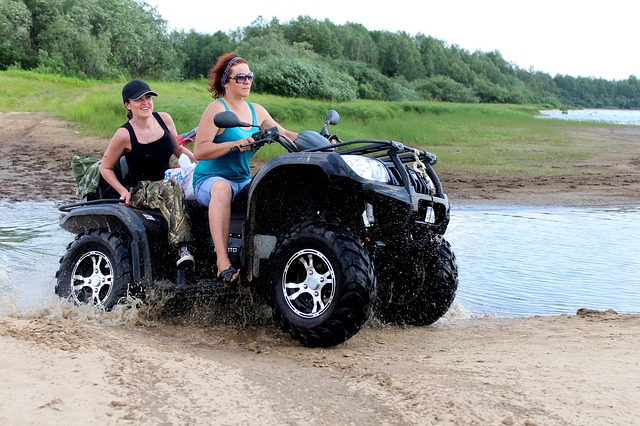
I prefer electric brakes, as they provide reliable stopping power and are easy to maintain.
The width and height of the trailer are also essential to consider since these dimensions determine how easily my ATV fits on the trailer and how secure it is during transportation.
I look for a trailer that is wide enough to accommodate my ATV comfortably but not excessively wide, which could make it harder to navigate on narrow roads.

Loading and unloading the ATV is an important aspect of using a trailer. I prefer trailers with a low loading angle to make it easier and safer to load and unload the ATV.
Ramps or tilt beds are features that can facilitate this process.
Tie-down points play a crucial role in securing the ATV during transportation. I always check for sturdy and well-placed tie-down points to ensure that I can secure my ATV properly.

These can be in the form of D-rings, stake pockets, or E-track systems.
Finally, I look for a trailer with a variety of available accessories, such as spare tire mounts or toolboxes, to enhance the functionality and make my towing experience more convenient.
These add-ons can be incredibly helpful in case of punctures or while carrying extra equipment during my adventures.

In conclusion, by focusing on these essential features like lights, brakes, width, height, loading and unloading, tie-down points, and accessories, I can make an informed decision when choosing the right ATV trailer for my needs.
Materials for ATV Trailers
When it comes to finding the right ATV trailer, the materials used in construction play a crucial role in determining its performance and durability.
I have encountered a couple of popular materials that are commonly used in crafting trailers, and I would like to share my insights on the pros and cons of each.
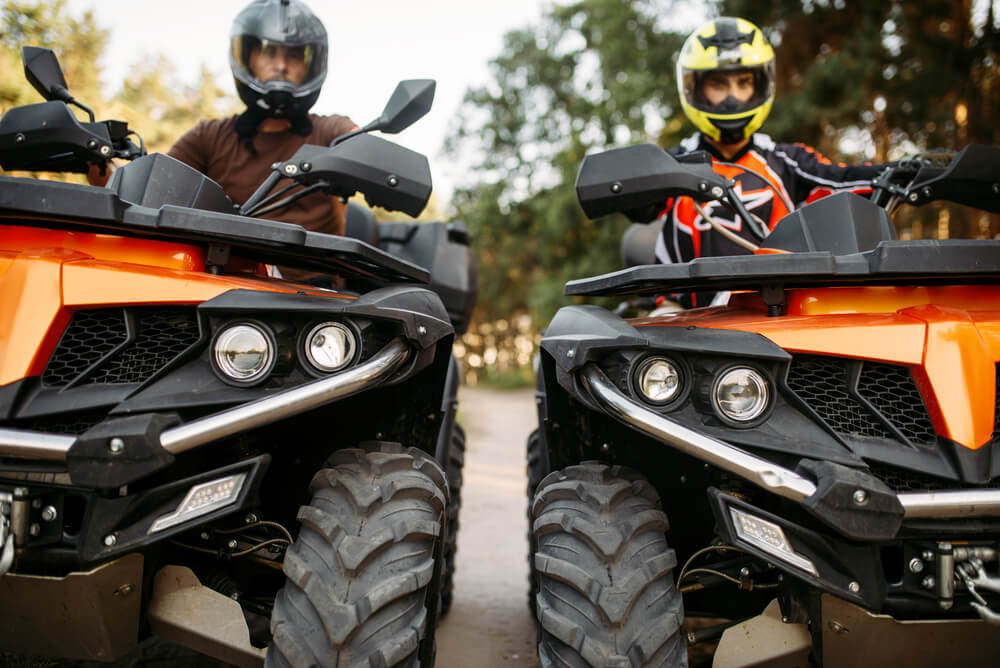
The first material I’d like to discuss is aluminum. Aluminum trailers are known for their lightweight build, making them easy to tow and maneuver. They are also resistant to rust, which is an essential advantage for any off-road adventure.
Yet, the lightweight nature of aluminum may also mean that they are less sturdy than their steel counterparts, especially when dealing with heavier loads.
The second material worth considering is steel. Steel trailers are typically stronger and more durable than aluminum ones. They can handle heavy loads and rough terrain with relative ease.
This strength, though, comes with a downside: steel trailers are much heavier than aluminum ones, which could mean a harder time towing and maneuvering them. Additionally, steel is susceptible to rust if not appropriately treated or maintained.

Both aluminum and steel come with their own sets of advantages and disadvantages. When deciding between the two, I’ve found it important to consider aspects such as the type of terrain I’ll be traveling on, the weight of my ATV, and my towing capacity.
After evaluating these factors, I can make an informed decision on which material will work best for my ATV trailer needs.
Considerations for ATV Trailer Size
When choosing the right ATV trailer, one of the most important factors to consider is the size of the trailer. The size you need will depend on various factors, such as the length of your ATV, the intended use, and the type of cargo you’ll be hauling.

As a starting point, it’s vital to measure my ATV’s length and width to make sure it fits comfortably on the trailer. A good rule of thumb is to choose a trailer that is at least one foot longer than the ATV itself.
This extra space allows for safe loading and unloading and prevents any potential damage due to tight squeezes.
Next, I like to think about the cargo I’ll be hauling. If I only plan to transport my ATV, a smaller trailer with a lower capacity might be enough. However, if I intend to carry additional equipment like camping gear or tools, it’s essential to choose a trailer with a higher weight capacity.
Considering the weight of my cargo ensures I don’t overload the trailer and prevents any potential issues while on the road.

It’s also important to take my towing vehicle and hitch type into account when choosing an ATV trailer size. I make sure to check my vehicle’s towing capacity and match it with the trailer’s weight.
Further, the hitch and trailer connector should be compatible, making the connection secure and hassle-free.
When I choose the right ATV trailer size, I consider three crucial factors: the length and width of my ATV, the weight and type of cargo, and my towing vehicle’s capacity and hitch type.
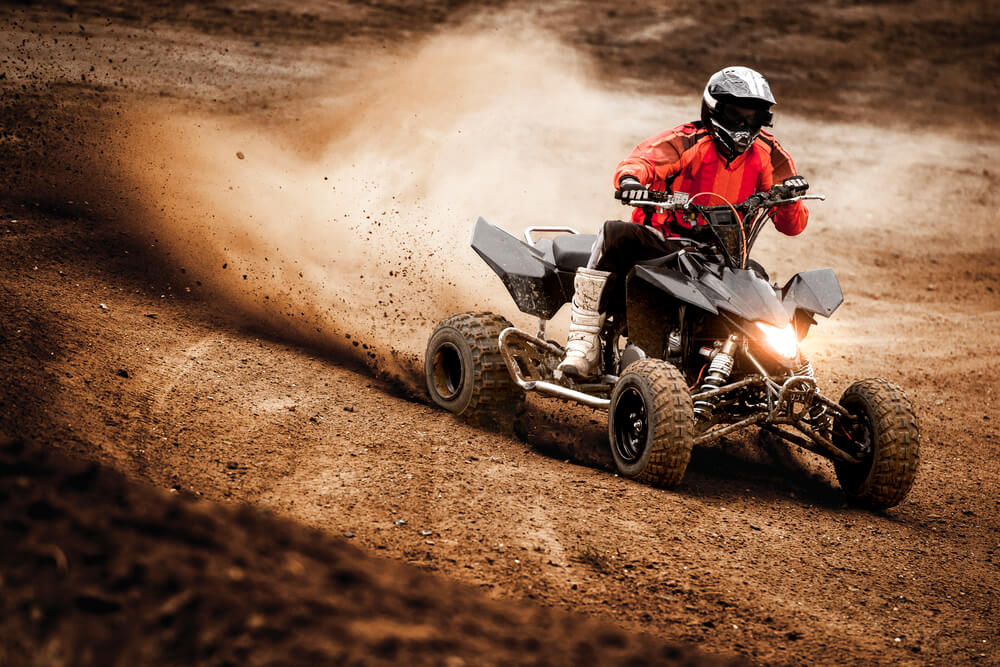
By taking these factors into account, I can make a well-informed decision and pick the ideal trailer for my needs.
Choosing the Right ATV Trailer Based On Your ATV
When it comes to picking the perfect ATV trailer, it’s essential to consider my specific ATV and its features. This means evaluating factors such as the size, weight, and towing capacity of my off-road vehicle.
Obviously, I have to ensure my trailer can safely and securely transport my ATV.
First, I need to take into account my ATV’s size and weight. A common mistake is choosing a trailer that is either too small or unable to handle the weight of my ATV. To avoid this, I will measure my ATV’s dimensions (length, width, and height) and check its weight in the owner’s manual.
This information will help me determine the appropriate trailer size and load capacity.
Another critical factor is my ATV’s towing capacity. Most ATVs, like my Polaris, have a specified towing capacity listed in the owner’s manual. For safety and optimal performance, I must ensure that the combined weight of my trailer and my off-road vehicle does not exceed this capacity.
My off-road riding style plays a role in choosing an ATV trailer as well. If I primarily ride on rough, uneven terrain, a trailer with sturdy, durable construction and off-road-friendly suspension is essential.
Alternatively, if I mostly ride on flat, well-maintained surfaces, then a simpler, lightweight trailer may be sufficient.
In addition to choosing a trailer that fits my ATV and its characteristics, I must also consider my storage needs.
Will my trailer fit in my garage or designated storage area? The last thing I want is to invest in an ATV trailer only to find out it doesn’t fit in the space allotted.
In summary, when selecting an ATV trailer for my off-road vehicle, taking into account my ATV’s size, weight, towing capacity, and riding style helps me make an informed decision.
Furthermore, considering my storage requirements ensures the trailer fits seamlessly into my life.
Importance of Customizability in ATV Trailers
As an ATV enthusiast, I understand the importance of having a customizable trailer. The ability to make adjustments to a trailer based on an individual’s needs can be crucial for transporting and protecting the ATV.
In this section, I will discuss some key elements that make customizability an important factor when choosing an ATV trailer.
First, let’s talk about tie-downs. They are essential to secure the ATV to the trailer while traveling. Most trailers come with some form of tie-down system, but a customizable trailer allows me to choose from various types of securing options.
For example, I can opt for adjustable straps that are easy to tighten or loosen, depending on the size and weight of my ATV.
Removable ramps are another great feature that customizable trailers offer. With this option, I can easily load and unload my ATV onto the trailer without any hassle.
Also, removable ramps can be stored securely on the trailer while I’m on the go, allowing me to save space and reduce the risk of misplacing them.
In some situations, I may need extra protection for my ATV from weather elements, such as rain, snow, or sun. This is where a roof comes in handy. Some trailers come with a built-in roof, while others offer the option to install a custom roof.
Having the ability to choose whether or not to have a roof on my trailer provides flexibility in how well I can protect my ATV during transport.
In conclusion, customizability plays a significant role in choosing the right ATV trailer. Features like tie-downs, removable ramps, and roof options allow me to tailor the trailer specifically to my needs.
By carefully considering these aspects, I can ensure a safe and convenient transportation experience for my ATV.
Examining the Fit of the Trailer On Your Vehicle
When I started searching for the perfect ATV trailer, one of the first things I considered was how well the trailer would fit on my tow vehicle. Since many factors come into play, I’m sharing some tips to help choose the right ATV trailer based on the fit.
Before browsing trailers, it’s essential to know the towing capacity of my vehicle. I checked the owner’s manual to find this information, which helped me narrow down the list of suitable trailers.
It’s crucial not to exceed the tow vehicle’s capacity, as it could lead to unsafe driving conditions or damage to the vehicle.
Next, I examined the type of trailer hitch on my tow vehicle. The most common types of hitches are receiver hitches and fifth-wheel hitches, but there are several others as well. The receiver hitch is a versatile option for smaller ATVs and trailers. Fifth-wheel hitches, on the other hand, are more suitable for heavy-duty towing.
I made sure that the hitch and the chosen trailer were compatible with each other.
The ball hitch size is another factor to consider. There are three main sizes: 1-7/8″, 2″, and 2-5/16″. Each size can only be used with a corresponding trailer coupler, so I checked both the ball hitch and the trailer coupler to confirm they matched.
Lastly, I focused on finding a trailer that fits me and my needs. I considered the terrain and conditions I would typically encounter, as well as the frequency of usage. Some trailers are designed for specific terrains, like a swivel wheel trailer, which offers better maneuverability in tight spaces.
Other trailers are built for off-road adventures or are adaptable to various types of adventures.
By taking these factors into account, I was able to find the right fit for both my tow vehicle and my needs, ultimately leading to a safe and enjoyable ATV towing experience.
Pricing and Quality Considerations
When I’m looking for the right ATV trailer, pricing and quality are some of the most important factors to consider. Finding the optimal balance between the two can be a bit tricky, but with some research, I can make the best decision for my needs.
First, I set a budget for the trailer, taking into account not only the cost of the actual trailer but also any additional costs like taxes, registration, and insurance. Sticking to a budget will help me narrow down my options and make an informed choice.
Next, I compare the various trailer models within my budget range. I look at their performance specifications, materials, and build quality. It’s essential to pay attention to their weight, dimensions, and load capacity as well.
I prefer trailers made from robust materials like steel or aluminum since they offer better durability and longevity.
Besides, it’s vital to consider the trailer’s suspension, wheel, and tire quality, as these components directly affect the performance and handling of the trailer. A good suspension will provide a smoother ride, while sturdy wheels and tires guarantee better stability and safety while driving.
Finally, I read online reviews and ask for recommendations from friends or family members who own ATV trailers, as they can provide valuable insights regarding a trailer’s performance, quality, and reliability.
By considering all these factors, I can find the best trailer to fit my needs and budget. It’s essential to remember that sometimes spending a little more upfront on a higher-quality trailer can save me money in the long run, as it may require fewer repairs and last longer.
Practical Tips for Storing and Using Your ATV Trailer
When it comes to storing my ATV trailer, I make sure it’s easy to store and doesn’t occupy too much space. If possible, I park it along the walls of my garage or shed to leave room for other items and to allow for easy access when needed.
Before loading up my ATV into the trailer, I always double-check the loading ramp for any damages or obstructions. This ensures a safe and smooth transfer of my vehicle from the ground to the trailer bed.
Don’t forget to wear protective gear like goggles during the loading process to prevent any accidents.
Taking care of the trailer’s bearings is essential for its smooth functioning. I make it a point to inspect and grease the bearings regularly. This not only helps with the trailer’s performance but also prolongs its overall lifespan.
In my experience, practice plays a crucial role in efficiently using an ATV trailer. I dedicate some time to practice loading and unloading my ATV. This helps me become comfortable with the process and reduces the chances of accidents or damage.
Lastly, always consider the intended use of your ATV trailer. Choose a trailer that fits your specific requirements in terms of capacity, size, and terrain compatibility.
Taking these factors into account will ensure that you get the most out of your investment and have a hassle-free experience with your trailer.
Flexibility in ATV Trailer Industries
When I began exploring the world of ATV trailers, I couldn’t help but notice the vast amount of industries utilizing these versatile tools. From construction and farming to tourism and adventure sports, it’s evident that the flexibility of ATV trailers is increasingly valuable across a broad range of sectors.
In the heavy-duty world of construction and farming, I’ve seen heavy-duty trailers that can carry large loads of materials, tools, or equipment. These trailers often feature rugged and durable designs, built to withstand the harsh conditions and demands of the job site.
On the lighter side, moving on to the fun world of adventure sports and recreational activities, companies in these industries often employ smaller, lightweight, and easily maneuverable trailers.
These components make it convenient for transporting ATVs to remote locations for off-roading excursions or races, enhancing the overall experience for thrill-seekers and outdoor enthusiasts alike.
The tourism industry has not been left behind, as they also tap into the ATV trailer market. Specially designed trailers are used for transporting ATVs to picturesque locations, allowing tourists to explore beautiful landscapes and immerse themselves in the local environment.
The unique balance between flexibility and functionality has made ATV trailers the go-to choice in the tourism sector.
To sum it up, the flexibility and adaptability of ATV trailers have made them indispensable across numerous industries. So, as I consider choosing the right ATV trailer for my needs, I keep in mind the diverse applications of these trailers, which showcase their impressive functionality and versatility.
Frequently Asked Questions
What factors should be considered for selecting an ATV trailer?
When choosing an ATV trailer, I consider several factors. The first is the size and dimensions of my ATV. The trailer should properly accommodate my vehicle. I also look at the weight capacity and suspension of the trailer – it should be strong enough to carry the weight of my ATV.
Lastly, I take into account the durability, price, and ease of use of the trailer.
How can I determine the appropriate trailer size for my ATV?
To determine the proper trailer size, I first measured the length, width, and height of my ATV. Then, I add extra space for fitting accessories or protective gear, like tie-down straps or wheel chocks.
It’s always better to choose a slightly larger trailer than needed, so my ATV will fit comfortably.
What are the differences between single and tandem axle trailers?
Single-axle trailers have one axle with two wheels, while tandem-axle trailers have two axles with four wheels. I find that single-axle trailers are usually lighter and more economical, but tandem-axle trailers provide better stability and load-carrying capacity.
Tandem axle trailers are also better suited for longer trips and rough terrain.
Which type of trailer is best for side-by-side ATVs?
For side-by-side ATVs, I recommend a trailer design that accommodates wider dimensions, such as a utility trailer with side rails or a flatbed trailer.
It’s important to ensure the trailer’s width and length can handle the size of my side-by-side ATV, as well as provide enough space for any additional gear or accessories.
Do I need an enclosed trailer or an open one?
Whether I need an enclosed or open trailer depends on my preferences and requirements. An open trailer is usually lighter, more economical, and easier to load and unload. Regardless, an enclosed trailer offers better security and protection from the weather.
If my primary concern is keeping my ATV safe from theft or avoiding damage due to weather, an enclosed trailer is a good choice.
What are the top brands of ATV trailers?
There are several well-known brands that manufacture quality ATV trailers. Some top brands I’ve come across include Big Tex Trailers, Aluma, Triton, Kendon, and Carry-On Trailer.
Each brand offers a variety of models in different sizes and styles, so it’s essential to research and compare their products to find the right trailer for my needs.
